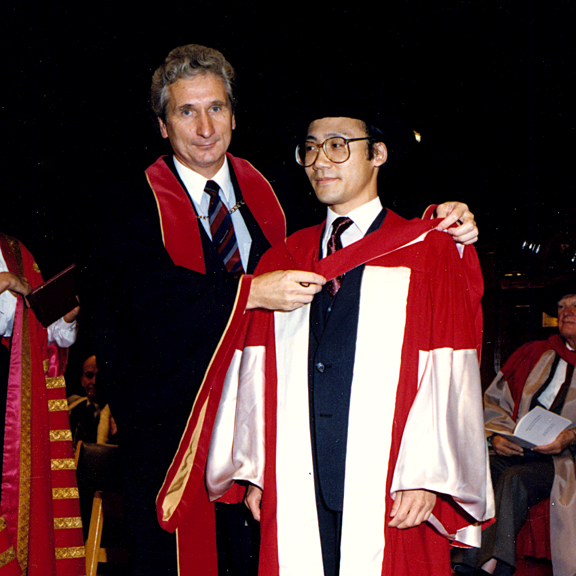1985 Fredericton Convocation - Ceremony A
Jay, Gilbert Wang-Hoi
Doctor of Science (D.Sc.)
Orator: Valenta, Zdenek
Image Caption
L to R: Dr. James Downey, Gilbert Wang-Hoi Jay
Second Image Caption
Source: PR-Convocation, 1985; Photo by Don Johnson
Citation:
CONVOCATION, OCTOBER, 1985
GILBERT WANG-HOI JAY
to be Doctor of Science
Earlier and better diagnosis and improved techniques of surgery and irradiation have combined in the last decade or so to increase the life expectancy of cancer patients. It has become clear, however, that before the practical question: "How do we really cure cancer?" can be answered or even attempted, the more fundamental question: "What exactly is cancer?" must be tackled. This is in the domain of molecular biology, in which the structure of a great variety of molecules as well as the interaction, or communication, between them are under scrutiny. Dr. Gilbert Jay is one of the foremost virtuosos in this field.
Currently the chief of the section of cell physiology at the National Cancer Institute in Bethesda, Maryland, he obtained his undergraduate education in biochemistry at McGill University and was subsequently the holder of the prestigious Paul Mazur Fellowship in Experimental Biology at Harvard University from which he graduated in 1974 with a Doctor of Philosophy degree.
Working at the Cancer Institute, Dr. Jay has sought to define how and why normal cells get transformed into cancer cells and has worked towards understanding how cancer cells escape immunological detection by the body's defense system. His numerous significant discoveries have profound implications for a future immuno-therapeutic approach to cancer, that is an approach in which only malignant, but not healthy, cells would be specifically affected and controlled.
To our great benefit, Gilbert Jay has been a regular visitor to this University and his lectures, his enthusiasm and his "man-in-motion" style have been a source of scientific information as well as inspiration and excitement to students and faculty alike.
The nature of molecular biology is such that collaboration between several research groups is often essential. Gilbert Jay has on occasion taken this path and one such collaboration has been with his brother Ernest, a professor at this University.
Toronto may have its Blue Jays, but from this day on—this institution will be proud and honored to have two true Jays among its doctoral alumni.
As our University enters its third century, we are all reminded by the selection of this candidate and by the consideration of his achievements that the pursuit of knowledge must always also be a pursuit of excellence.
From: Honoris Causa - UA Case 70, Box 2
GILBERT WANG-HOI JAY
to be Doctor of Science
Earlier and better diagnosis and improved techniques of surgery and irradiation have combined in the last decade or so to increase the life expectancy of cancer patients. It has become clear, however, that before the practical question: "How do we really cure cancer?" can be answered or even attempted, the more fundamental question: "What exactly is cancer?" must be tackled. This is in the domain of molecular biology, in which the structure of a great variety of molecules as well as the interaction, or communication, between them are under scrutiny. Dr. Gilbert Jay is one of the foremost virtuosos in this field.
Currently the chief of the section of cell physiology at the National Cancer Institute in Bethesda, Maryland, he obtained his undergraduate education in biochemistry at McGill University and was subsequently the holder of the prestigious Paul Mazur Fellowship in Experimental Biology at Harvard University from which he graduated in 1974 with a Doctor of Philosophy degree.
Working at the Cancer Institute, Dr. Jay has sought to define how and why normal cells get transformed into cancer cells and has worked towards understanding how cancer cells escape immunological detection by the body's defense system. His numerous significant discoveries have profound implications for a future immuno-therapeutic approach to cancer, that is an approach in which only malignant, but not healthy, cells would be specifically affected and controlled.
To our great benefit, Gilbert Jay has been a regular visitor to this University and his lectures, his enthusiasm and his "man-in-motion" style have been a source of scientific information as well as inspiration and excitement to students and faculty alike.
The nature of molecular biology is such that collaboration between several research groups is often essential. Gilbert Jay has on occasion taken this path and one such collaboration has been with his brother Ernest, a professor at this University.
Toronto may have its Blue Jays, but from this day on—this institution will be proud and honored to have two true Jays among its doctoral alumni.
As our University enters its third century, we are all reminded by the selection of this candidate and by the consideration of his achievements that the pursuit of knowledge must always also be a pursuit of excellence.
From: Honoris Causa - UA Case 70, Box 2
Citations may be reproduced for research purposes only. Publication in whole or in part requires written permission from the author.
